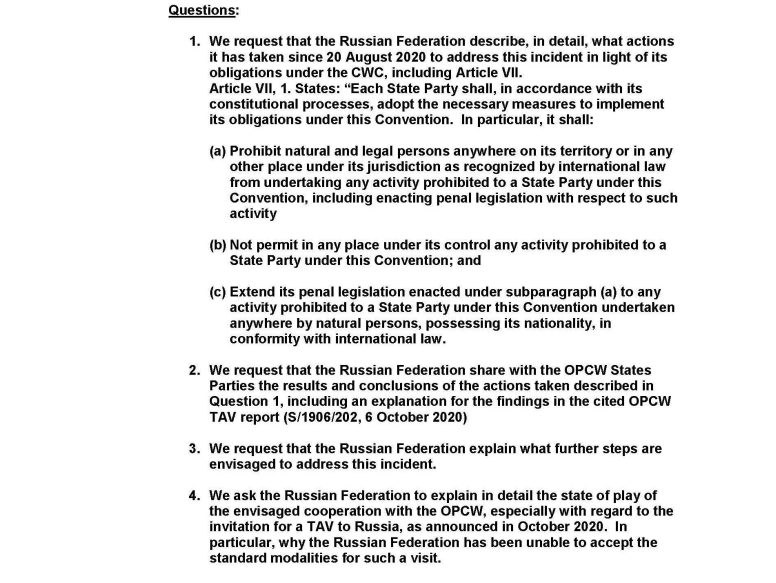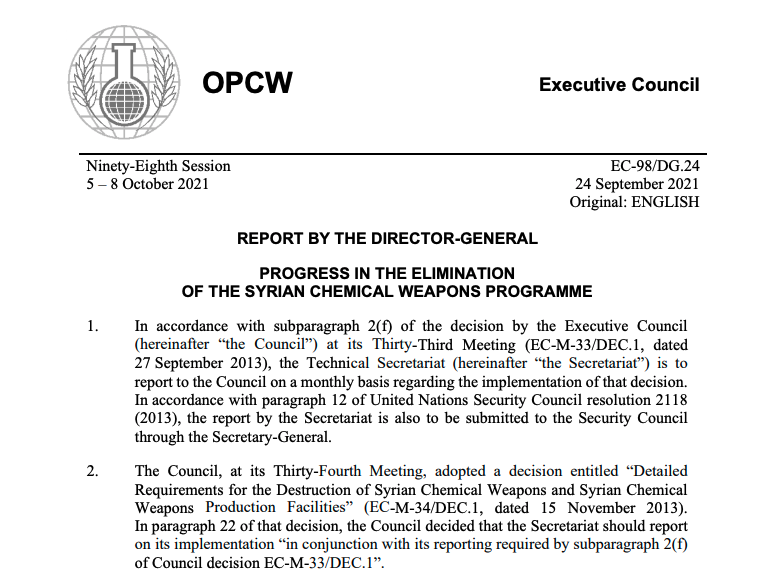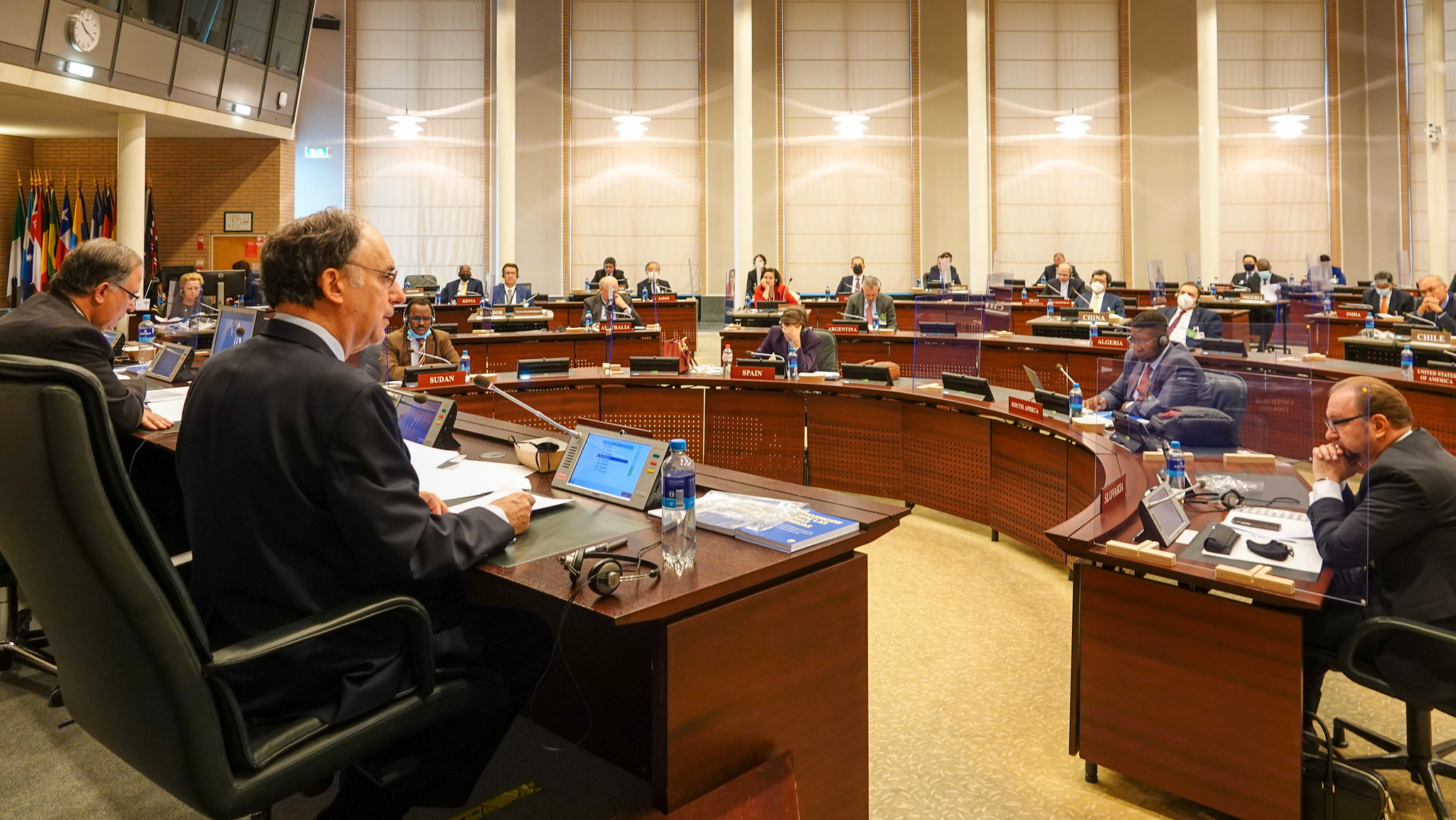Event and Conference Summaries
Summary Report
98th Executive Council Meeting
The 41-member Executive Council (EC) of the Organization for the Prohibition of Chemical Weapons (OPCW) convened in The Hague from October 5 to October 8, 2021, for the 98th Executive Council (EC-98) session. The Executive Council is responsible for promoting the effective implementation of and compliance with the Chemical Weapons Convention.
This summary report will cover:
- Descriptions and key quotes of the major thematic topics discussed within the national statements of Council member states
- Items of note, including: draft decisions, notes verbales, reports by the Director-General
Need a refresher on the OPCW, CWC, or Executive Council? Check out these short educational videos produced by the OPCW. The EC will typically meet 3 times annually with several additional special sessions.
Major Themes and Key Quotes
Please note: selected quotes are not necessarily representative of the views of the CWC Coalition or any of its members. Quotes are selected to highlight the diversity of opinions in the OPCW, and we try to find quotes that summarize the views of more than one country. Quotes will not always reflect all view points – they serve an educational purpose, but are not intended to give the reader a full understanding of all perspectives on each of these complex issues.
Syria
At the second half of the 25th Conference of the States Parties (April 2021), the states parties voted to suspend Syria’s rights and privileges under the convention until it addresses 19 outstanding issues regarding its initial declaration of its chemical weapons stockpile and program. During EC-98, states called on Syria to increase cooperation with the OPCW, issue visas to OPCW inspectors, explain the destruction of chlorine cylinders that were related to an ongoing OPCW investigation, and provide answers for discrepancies noted by the Declaration Assessment Team (DAT). Other nations claimed that the vote to suspend Syria’s rights and privileges was politically motivated.
“The latest developments are worrisome, to say the least, with regard to Syria’s cooperation with the Technical Secretariat. Far from being exemplary in the past, we note a clear slowdown and ever greater obstacles: the refusal to issue a visa for the liaison officer posted in Damascus, the postponement of the deployment of the DAT and then the refusal to issue a visa for one of the team members, the extension of the tripartite agreement between Syria, the OPCW and the UNOPS for only 3 months, etc.” – H.E. Luis Vassy, France
The Budget
The OPCW is proposing a biennial budget, which would cover expenses for both 2022 and 2023, rather than an annual budget. Moving from an annual budget to a biennial budget is seen as a way to help the OPCW set clear priorities and assist with longer-term planning. EC-98 voted to recommend adoption of the budget, but final adoption will be considered by all states parties at CSP-26 in November. Vote breakdown: 31 yes, 3 no (China, Iran, Russia), 7 abstentions.
“The OPCW’s first biennial draft budget proposes an increase to assessed contributions in order that the organization can move towards a Zero Real Growth budget. A Zero Real Growth budget would take into account the pressures of inflation on the Organization’s finances. Canada supports this movement towards a more accurate financial picture. […] Over the last decade, Zero Nominal Growth (ZNG) budgeting for the OPCW has painted an unrealistic picture of the organization’s finances and resulted in an unsustainable and precarious financial situation. ZNG-based budgeting has had a negative impact on the organization’s core operational capacity.” – H.E. Lisa Helfand, Canada
Russia
Forty-five member states produced a joint statement, delivered by Bulgarian Ambassador Krassimir Kostov, that called on Russia to cooperate fully with the OPCW in a thorough and transparent investigation of the poisoning of Alexei Navalny, which took place in August 2020. Multiple laboratories have identified the substance used in the assassination attempt as a military nerve agent belonging to the Novichok group.
“Despite repeated requests from large numbers of States Parties to the Convention, the Russian Federation has not yet provided a credible explanation of the incident that took place on its soil. We have no knowledge of any internal investigations taking place in the Russian Federation. Nor do we know what, if anything, the Russian Federation will do to prevent future uses of chemical weapons on its territory.” – EC-98 Agenda 6G Joint Statement
Appointment of the Director General
Member states will vote to elect the Director-General of the OPCW at the upcoming 26th Conference of States Parties (29 Nov. – 3 Dec. 2021). Many nations expressed support for the re-appointment of the current Director-General, H.E. Fernando Arias, for a second term. The member states of EC-98 voted to recommend a second term for H.E. Arias, and a final vote on the matter will be conducted by all members at CSP-26 in November/December.
“We continue to lend our full support and confidence in Director-General Fernando Arias for his able leadership, commitment and hard work. Lithuania favours his re-appointment for a second term in office. We have full confidence in the professionalism and impartiality of the OPCW’s Technical Secretariat.” – H.E. Vidmantas Purlys, Lithuania
The ChemTech Centre
Construction of the Centre for Chemistry and Technology (ChemTech Centre) began October 2021 and is scheduled to be completed by the end of 2022. The new facility aims to help the OPCW keep pace with current threats, conduct research to support verification methods, enhance the Technical Secretariat’s ability to provide training activities, test and deploy equipment, and act as a knowledge repository.
“We remain confident that the Centre will play a significant role in promoting international cooperation and assistance aimed at advancing the Organization’s efforts towards capacity building mainly in research and data analytics, forensic and laboratory work, training and knowledge sharing, especially for African States Parties.” – H.E. Lounés Magramane (Algeria), on behalf of the Group of African States Parties
The IIT
The Investigation and Identification Team (IIT) was established by the OPCW in 2018 and is “mandated to investigate cases where the OPCW Fact-Finding Mission (FFM) in Syria has determined that the use or likely use of chemical weapons has occurred.” The IIT has released two reports based on their findings. During EC-98, many nations expressed support for the IIT and its findings, while a few claimed that the IIT is outside the mandate of the CWC and should not be included for funding in the OPCW annual budget.
“The delegation of the Islamic Republic of Iran is not satisfied that once again the draft decision on Programme and Budget has been provided in an omnibus format. Furthermore, The Islamic Republic of Iran has never recognized the establishment of the IIT in the Organization and is not in a position to accept allocation of budget to the activities of this Team at any form.” – H.E. Alireza Kazemi Abadi, Islamic Republic of Iran
US Stockpile Elimination
Under its treaty obligations, the United States must finish destroying its chemical weapons stockpile by September 2023. Out of the 8 member states that declared chemical weapons stockpiles, the United States is the last to finish stockpile destruction. Some nations singled out the United States and called on that nation to complete destruction ahead of schedule.
“On September 4, the Blue Grass Chemical Agent-Destruction Pilot Plant Static Detonation Chamber reached an historic milestone when it destroyed the last sulfur mustard (H) 155 millimeter projectile. This is a noteworthy accomplishment as it eliminates another entire class of chemical agent from the U.S. stockpile. The United States continues to review opportunities to optimize performance at the facilities and to act on opportunities to accelerate the completion of chemical weapons destruction. We remain on-track to meet our planned completion date.” – H.E. Joseph Manso, United States of America
Voting by Consensus
Several nations have continuously expressed that the Executive Council and the Conference of the States Parties should only adopt a decision once consensus has been reached. Some nations allege that other countries will push through “politically motivated” decisions if they believe they have enough votes. Consensus voting would mean that any state party could veto or delay a proposed decision.
“We note the merits of the draft decision on allowing the convening of Executive Council meetings or sessions in extraordinary circumstances. We would like to place on record our appreciation for the Co-sponsors of the draft decision for making it clear that they would only adopt the draft decision by consensus, thus respecting the OPCW traditional practice of consensus-based decision-making. India remains willing to engage further to find consensus on the draft decision.” – H.E. Pradeep Kumar Rawat, India
Chemical Security
Chemical security refers to “measures to prevent deliberate releases of toxic chemicals” and “includes policies to prevent attempts to acquire toxic chemicals or chemical weapons precursors.”
“The African Group commends the work of the Open-Ended Working Group on Terrorism (OEWG-T) chaired by H.E. Ambassador Vusimuzi Philemon Madonsela of the Republic of South Africa and the Sub-Working Group on Non-State Actors. We look forward to the continuous facilitation of discussions, to promote global chemical security in light of Council decision EC- 86/DEC.9. In this regard, the African Group strongly believes that the constant coordination between international organizations and relevant stakeholders is crucial in building awareness on chemical security and advancing global efforts to prevent chemical terrorism as well as the re-emergence of chemical weapons, within the scope of the Convention and the Organization’s mandate.” – H.E. Lounés Magramane (Algeria), on behalf of the Group of African States Parties
Abandoned Chemical Weapons
Japan has an obligation as an Abandoning State to complete the destruction of abandoned chemical weapons left on Chinese territory. According to China’s national statement at EC-97, Japan is set to complete destruction activities by the end of 2022, but China’s national statement at EC-98 warned that destruction progress has been impacted by COVID-19 (many other countries also have abandoned and/or old chemical weapons, buried on land or dumped at sea, requiring eventual verified removal and remediation).
“The destruction of abandoned chemical weapons (hereinafter “ACW”) constitutes an important component of the Convention, on which the realization of “a world free of chemical weapons” hinges. The Covid-19 pandemic has posed serious challenges to the work of Japanese ACW destruction. Against the backdrop, China endeavored to facilitate the steady resumption of the destruction at Haerbaling. However, the overall destruction process still lags far behind the schedule. China urges Japan to earnestly fulfil its obligations as an Abandoning State by stepping up its inputs, to complete the destruction at its soonest, and properly address such prominent issues as the contaminated soil. China will continue its cooperation with Japan and the Secretariat, and provide its assistance as always.” – H.E. Tan Jian, People’s Republic of China
NGO Participation
NGOs and civil society play an important role in supporting the full universalization of the CWC through their research, advocacy, and outreach. NGO participation in the annual Conference of the States Parties to the CWC has been impacted by the ongoing global pandemic. Despite restrictions on in-person participation, NGOs should still remain involved with the CSP and have opportunities to share NGO statements and relevant research.
“Canada hopes that the tendency of States Parties will be to maximize the presence of civil society partners at the upcoming Conference. NGOs have a valuable perspective to add to our understanding of the challenges we face.” – H.E. Lisa Helfand, Canada
Items of Note

01. Navalny
On behalf of 45 States Parties, the United Kingdom submitted a notes verbale (No. 093/2021) requesting answers from Russia about the poisoning of Mr. Alexei Navalny. The note verbale cites paragraph 2 of Article IX of the CWC, which states that “States Parties should, whenever possible, first make every effort to clarify and resolve, through exchange of information and consultations among themselves, any matter which may cause doubt about compliance with this Convention.” Russia has 10 days to respond to the request.

02. Organizational Governance
On behalf of 13 member states, Germany submitted a notes verbale (No. 33/2021) with the draft decision entitled “Allowing the Convening of Executive Council Meetings or Sessions in Extraordinary Circumstances.” In light of COVID-19 restrictions impacting the ability of international organizations to meet and perform essential duties, Germany and the co-sponsors of the draft decision recommend that, in the event that “extraordinary circumstances” occur, there could be the option of meeting either in a different location or remotely using virtual meeting technology.

03. Syria
The Director-General distributed the 96th monthly report on “Progress in the Elimination of the Syrian Chemical Weapons Programme.” The Secretariat noted that it has not received further information and documentation from Syria regarding the damage caused to the military facility (which housed a declared former CW production facility) allegedly targeted in an attack that destroyed two chlorine cylinders related to the chemical weapons incident that took place in Douma in 2018.
